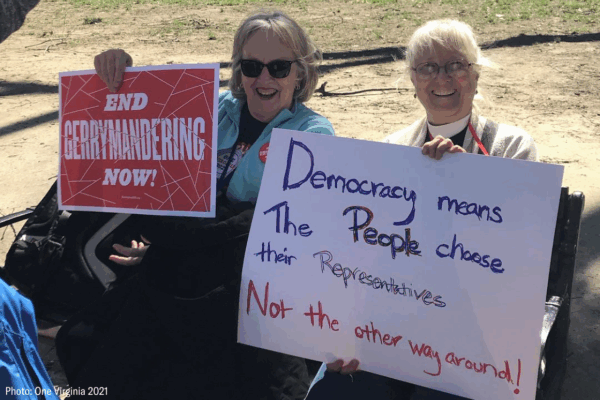By Paul Smith, vice president of Campaign Legal Center, and Claire Gastañaga, executive director of the ACLU of Virginia. This op-ed was originally published in The Roanoke Times on Sunday, Feb.9, 2020.
Virginia has long been plagued by partisan and racial gerrymandering. For decades, politicians on both sides of the aisle have abused the map-drawing process that determines state legislative districts, drawing lines that firm up their own job security, shielding themselves from transparency and accountability, in effect, choosing their voters.
The lines drawn after the 2010 Census were so badly gerrymandered along racial lines that they were struck down by the U.S. Supreme Court last year resulting in newly drawn districts that brought positive changes in the representation of women and minorities in our legislature.
Last year, the proposed constitutional amendment to create the Virginia Redistricting Commission and give Virginia voters a guaranteed voice in legislative map passed the House by a margin of 83-15 and the Senate unanimously. At the time, Republicans maintained a slim majority in both houses. The amendment must be passed again this year to allow Virginians the opportunity to vote to amend the constitution this fall.
Passing a constitutional amendment paired with strong enabling legislation is the best option to move Virginia past the corrosive partisanship that has too long distorted the political map-drawing process at the expense of voters statewide.
The amendment before the legislature now isn’t perfect, but it is a major step forward. Voters deserve the chance to vote to approve it this November and have it implemented in time to affect the 2020 redistricting process.
The proposed amendment creates a “hybrid commission” of 16 members, comprised of eight legislators and eight citizens, evenly balanced by party affiliation. There are added protections for racial and ethnic communities, and the system will be opened up to increased public input and transparency.
Despite the plan’s popularity, news reports indicate that some Democratic lawmakers — now enjoying majorities in the General Assembly — are having second thoughts. Some may be hesitant to give up the power to redraw districts now, even though they voted for the very same proposal when they were the minority party. Others have expressed concerns about the Supreme Court of Virginia drawing the maps if the commission is deadlocked and about whether there are adequate protections for racial equity. The history of the Commonwealth makes these concerns understandable, and they are being addressed in complimentary enabling legislation.
Putting this commission in place doesn’t mean the effort to achieve a more representative legislature will end. The benefits of guaranteed voter participation in redistricting will have a compounding effect. When voters elect politicians under fair maps, future legislatures are likely to be amenable to further reforms down the line, which could result in improvements to the commission. For example, legislators could be excluded from sitting on the commission entirely. Or, protection of incumbents could be explicitly forbidden. For now, it’s important that we not let the perfect be the enemy of the good.
Alternative proposals are being discussed, such as pursuing a purely legislative route. This is risky because it leaves ultimate decision-making in the hands of the General Assembly and only the constitution can bind the legislature. If history is our guide, the party that controls redistricting rarely avoids the temptation to gerrymander. It will be a travesty if partisanship overrides fairness again.
The public is ready for reform. Voters nationwide overwhelmingly support redistricting reform. A 2019 national poll commissioned by the nonprofit Campaign Legal Center (CLC) found strong opposition to gerrymandering with broad, bipartisan support for the creation of independent redistricting commissions. In fact, 65% of voters surveyed would prefer congressional districts with no partisan bias, even if it meant fewer seats for their own party.
Virginians are in line with this national trend. A December 2019 survey shows that Virginia voters strongly support the second passage of the redistricting reform constitutional amendment, by a 70%-15% margin.
People understand that majorities in government come and go. Today, it may be your party reaping the benefits of increasingly sophisticated computer modeling to manipulate districts and hold onto power. But tomorrow, you may be in the minority and robbed of your voice. This has been the reality in Virginia, but it doesn’t have to continue for another decade.
Virginia legislators, regardless of party, should put principle over partisanship and vote to give Virginians the opportunity to vote this fall to amend the constitution to assure fair redistricting in 2020 and in future decades.

